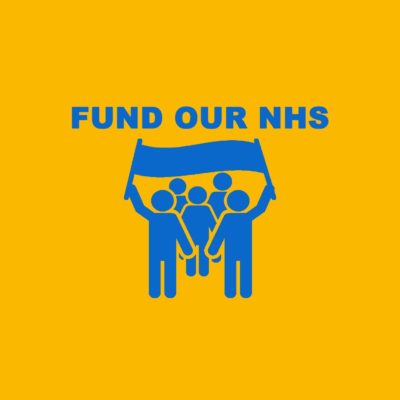
This article by Keep Our NHS Public Secretary John Lister, was originally published in The Lowdown.
He almost certainly did not mean to trigger panic, but few will have been reassured by Matt Hancock’s admission that the government’s leaked worst case scenario of 80% of the British population being infected with the coronavirus and half a million dying from it was “reasonable.”
Nor will they be comforted by Nadhim Zahawi’s boast on the BBC’s Question Time that ministers had allocated a miserable £45 million to the work of the Cobra committee, or by the lackadaisical approach to convening it by part-time Prime Minister Boris Johnson, who has now said that the virus is likely to “spread a bit more”.
No early warnings, please, we’re British
Least of all will thinking people be impressed by the decision of No 10 to put public health at risk in future by blocking common sense plans by Matt Hancock for Britain to retain membership of the EU’s Early Warning and Response System, which was key to combatting the bird flu outbreak and is helping to coordinate efforts throughout Europe to deal with the coronavirus.
If the government’s efforts have so far been underwhelming or counter-productive, it appears that cash-strapped and already over-stretched NHS trusts are also struggling to implement some of the plans that have been announced.
Following the lessons of the response to the swine flu pandemic ten years ago, hospital bosses have been told to create “pods” to allow people who suspect they’ve been exposed to the virus to be isolated for testing. The HSJ reports that uncapped capital is available to help fund such provision.
However the Sun highlighted the “isolation pod” at Lincoln County Hospital, which turned out to be “a small tent behind some bins with one chair and a phone to call 111.” The facilities were described as “something that Bear Grylls would keep in his backpack”. Trust bosses insisted the tent was “not meant for treatment and will be upgraded.”
Targets missed
The problem is that hospital bosses already had a struggle on their hands dealing with yet another winter of increased demand, leaving many hospitals on or close to 100% occupied even without any coronavirus patients to take care of. The NHS is missing all its key performance targets. But if infected people ignore advice and go to hospital, long delays in overcrowded A&E departments and corridors could compound the problem.
The BMA pointed out in early February that with more patients already facing delays in treatment than the previous winter: “Stories of patient deaths on corridors, rammed emergency departments and cancellations of patient’s procedures as a daily occurrence are becoming the new norm as doctors across the country say they are exhausted and run into the ground.”
Shadow Health Secretary Jonathan Ashworth has also emphasised that the NHS capacity to respond to the coronavirus has been massively constrained by ten years of real terms cuts: “After years of Tory austerity, we know we’ve lost well over 15,000 beds since 2010,” he said.
“We know that last week critical care bed occupancy was running at over 80%. There are serious questions about whether the NHS has the resources, the staff and the capacity to provide the care that’s needed should this seriously escalate.”
The latest planning guidance from NHS England, calling for an end to any further bed closures, tells trusts that the crisis provision for this winter should become the new norm:
“The default operational assumption is that the peak of open bed capacity achieved through the winter of 2019/20 will be at least maintained through 2020/21, including the 3,000 increase from October 2019 already planned for.”
But clearly this takes no account of a pandemic that is estimated could infect up to 4% of the population – over 2 million people.
On Question Time Big Issue founder John Bird argued that “This is not just a health crisis, it’s a social crisis,” he said, arguing the Government needs to round up every available health facility and resource it has to tackle the ‘war’. Bird, apparently unaware of just how small the British private hospital sector is, with just over 2,500 acute beds (many of them staffed by NHS staff working additional hours) called for: “the nationalisation of the health service in the truest sense of the word for a particular time in order to deal with this pandemic.”
In the US, the former chief of the Center for Disease Control and Prevention Dr Tom Frieden has warned that it is “inevitable” that the coronavirus becomes a pandemic: “The last moderately severe influenza pandemics were in 1957 and 1968; each killed more than a million people around the world. Although we are far more prepared than in the past, we are also far more interconnected, and many more people today have chronic health problems that make viral infections particularly dangerous.”
A US, where only 500 people so far have been tested, and punitive charges are putting off people with limited insurance from seeking tests, academic simulation of a coronavirus pandemic showed a world wide death toll of around 65 million, until 80–90% of the global population had been exposed, after 18 months: the spread was eventually “slowed due to the decreasing number of susceptible people. The organisers insist that this was a theoretical scenario, not a prediction.
However the state of Washington in the US North West has declared a state of emergency after a patient in their fifties died, and two more cases were discovered. Researchers warned the virus may have been spreading unfettered for weeks and infected 1,500 people.
“Battle plan”
So how will the NHS cope, and how well prepared is the government? Boris Johnson’s so-called “battle plan” includes trying to bring recently-retired doctors and nurses to return to work in the NHS (although older age groups are more vulnerable to the virus, and many of those who have recently retired have left early as a result of stress and burn-out).
If the coronavirus outbreak worsens, ministers are saying emergency powers could be employed to close schools and ban large events, and Matt Hancock has refused to rule out locking down whole cities, along the lines of the Chinese government’s isolation of Wuhan.
It’s clear that the virus is now beginning to spread: and the question of how NHS staff are led, managed and treated is important, after the recent NHS staff survey highlighted widespread bullying, with less than a third of staff believing there enough staff in their organisation for them to do their jobs properly and 40% reporting work related stress (See Roger Kline’s Opinion column).
Staff unions and NHS employers have issued guidance on how best to respond should any patients with suspected Covid-19 require a diagnosis or treatment. The aim is to ensure staff know exactly what to do with individuals who’re concerned they have the virus and how to treat infected patients, with minimal risk to themselves.
It advises NHS trusts to ensure that all staff – including those employed by contractors – must know how to lower their infection risk. For example, regular hand washing and using – and disposing of – tissues.
Contractors
But of course there are problems where management – or private contractors who have refused to grant staff equivalent terms and conditions equivalent to the NHS national Agenda for Change provisions – fail to address key issues.
For example ensuring that staff who are required to miss time from work are able to survive on what sick pay they receive. The guidance says that where staff are required to self-isolate, it is vital that employers clearly communicate pay arrangements during this period of absence, and that
“Where staff are being paid under contractual sick pay, any absence should be treated as an absence related to compliance with national infection control guidance and should not count towards any sickness absence policy triggers.”
Meanwhile for many of the 1 million staff working in social care, the vast number of them for private employers on far worse conditions that the NHS, and many on zero hours contracts at minimum wage, the question is whether they get any sick pay at all.
Matt Hancock has tried unconvincingly to suggest that the vicious bureaucrats of the Department of Work and Pensions will provide support for self-employed and casual workers who self-isolate for medical reasons, but their dismal track record on Universal Credit gives little reason to trust them to get this right.
The GMB union has flagged up this issue – which seems not to have been even considered by ministers:
“Workers in the so-called gig economy, or on zero hours contracts, are left abandoned and penniless if they have to self-isolate. Once again the bogus self-employment model is screwing over the disadvantaged.
“GMB is calling on all employers – regardless of the contract– to do the right thing and pay their workers if they have to take time off due to the global health crisis.”







Leave a Reply